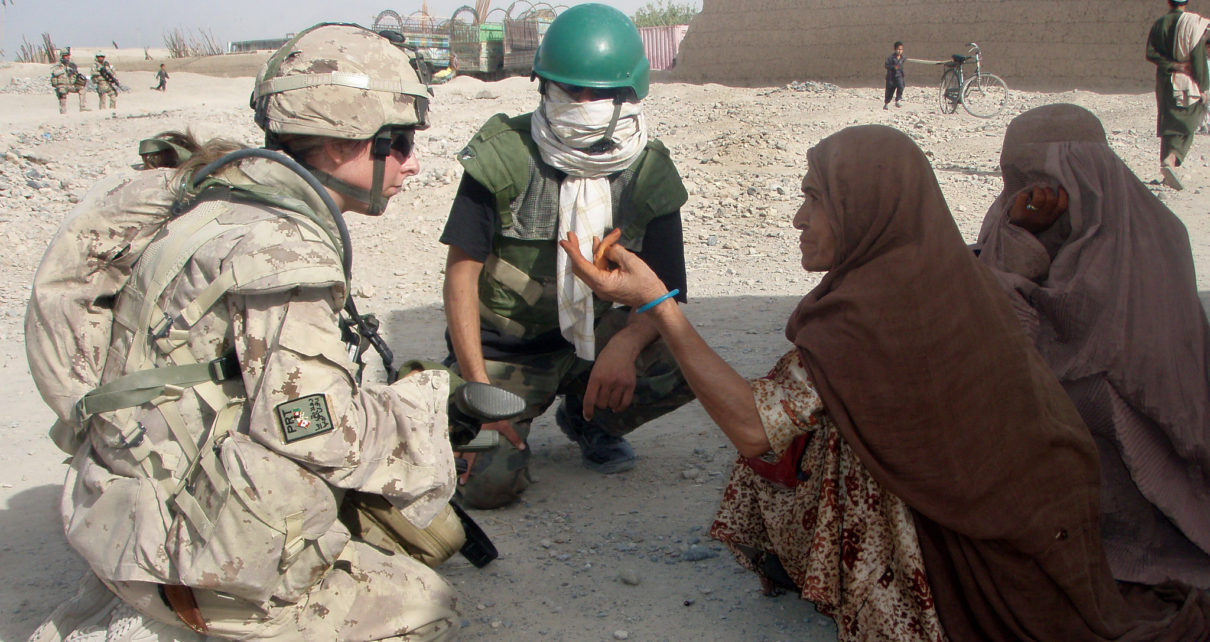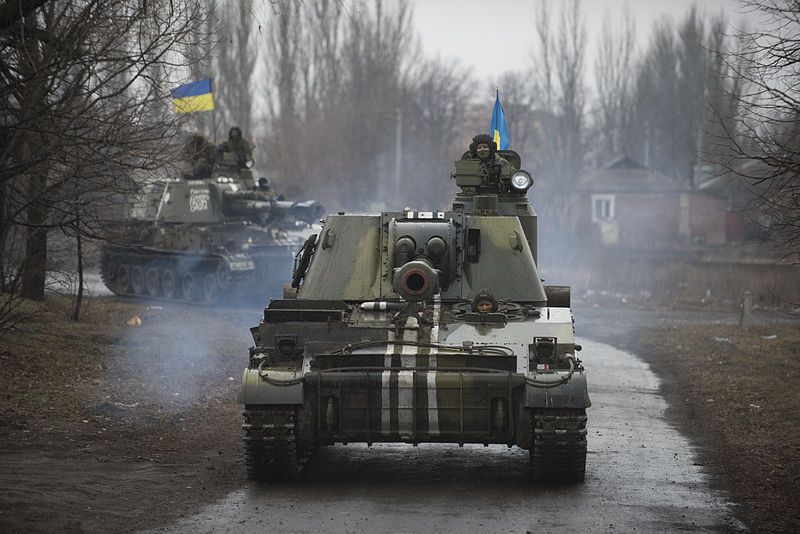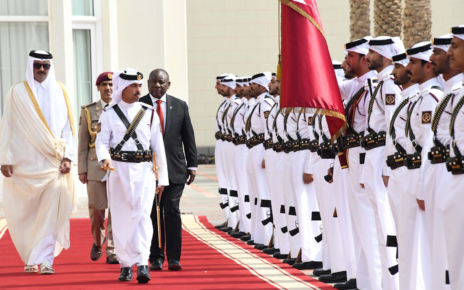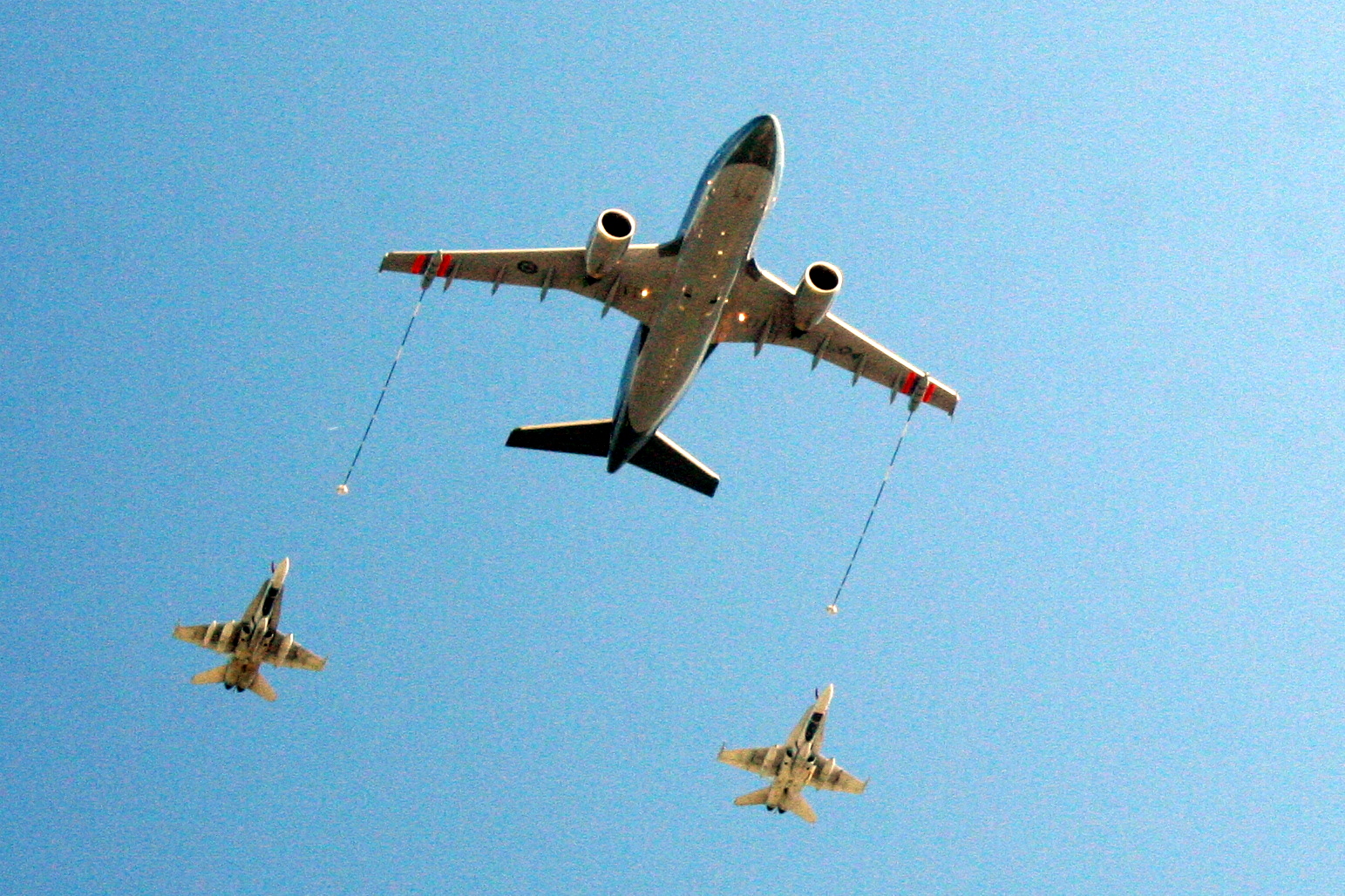Photo: A Canadian soldier and an Afghan interpreter converse with an Afghan woman in Kandahar as part of Allied reconstruction efforts in that district. 08/26/2007. Picture by Cpl Simon Duschesne, via flickr. Licensed under CC BY 2.0.
On September 27th, 2015, Mohammad Omar Abdullah fled his home in Kabul, leaving behind his wife and daughters. He walked seven days to reach the Iranian border where, after selling all his possessions, he was able to secure safe passage to a refugee camp in Turkey. At the gateway to Europe, Omar boarded a small dingy to reach Lesbos Island in Greece, an event that would prove to be catastrophic. The boat capsized and left Omar shipwrecked for 14 hours, only avoiding death thanks to a Turkish Coast Guard patrol. After spending three days at a hospital, he attempted the journey again and successfully reached continental Europe. After trekking for 45 days through Macedonia, Croatia, Slovenia, and Austria, Omar finally found asylum at a refugee camp in Germany, where he currently resides and works as a nursing assistant at a regional hospital.
Omar’s exodus from Afghanistan was not his choice, however. He did this because of the mounting death threats and dangers he faced from the Taliban due to his service as an Afghan interpreter with the Canadian Army in Kandahar in 2010. Attached to a platoon of Canadian soldiers from the Royal Canadian Regiment, Omar participated in multiple combat operations in support of Operation ATHENA, Canada’s contribution to crush the Taliban insurgency and bring stability to Afghanistan. “He was a critical asset to our counter-insurgency mission, which required extensive engagement with locals and with the Afghan National Army,” recalls retired army Captain Geoffrey Haskell, who served with Omar for seven months as a platoon leader. “Without interpreters,” he went on to say, “we would have had zero chance of success.”
As the war in Afghanistan draws to a close in the upcoming months, and Allied personnel leave the country, Afghan interpreters and their families are facing growing threats for their past service with ISAF and NATO. These brave men answered the call to action and joined American, British, and Canadian troops on dangerous missions for months on end without any former military training, in support of critical counterinsurgency operations. Not only did they provide critical language support for Coalition troops in a linguistically diverse region, they also proved to be an asset for their cultural and geographical knowledge. Serving as an extra set of eyes and ears, these interpreters were often instrumental in completing certain missions, and saved countless Canadian lives. “Interpreters were directly exposed to all the risks we were exposed to, i.e. gun-fire, IEDs, intense heat, etc,” explained Haskell. “However, they faced the additional risk of being identified by the Taliban as an interpreter, which was, and is, a death sentence.”
Currently, the Taliban control 85% of districts in Afghanistan and are rabidly seeking retribution for those who stood against them. Now that the American withdrawal is in full effect, there lacks a protective presence for these key individuals who are considered high value targets for these men and their families. Before Mohammad Omar Abdullah fled Afghanistan, he received death notes on his front door saying, “we know who you are, and we will kill you.”
Omar’s story is in no way unique, but he was able to flee the country and hide his family. The same could not be said for many other interpreters. Sakhidad Afghan, an interpreter who served with U.S Marines during the Battle of Marjah in 2010, was tortured to death by the Taliban after American forces reduced their presence in the country. A picture of his dead body was circulated on Facebook. He was only 24.
Sherin Agha Jafari, who served alongside American combat units, lost his father when the Taliban raided his home. “They came inside. They kept asserting, ‘we know who you are.’ Jafari recounts. “When we were running away one of them shot at us and they killed my father.”
Mohammad Ismail Sahaak, the administrative head of the Central Statistics Organization (CSO), was gunned down in early April at a gas station by unknown assailants. Many believe it was due to his past life as a translator for NATO forces.
Sohail Pardis, who served 16 months with the United States Army, was beheaded by militants last month after being kidnapped at a Taliban checkpoint. He was on his way to pick up his sister in Khost for Eid celebrations. A family friend recalled that Pardis received a death threat that said, “you are the eyes of the Americans and you are infidel, and we will kill you and your family.”
With the U.S pullout imminent, as many as 115 former interpreters and their families who worked with Canadian troops could be in danger of the Taliban’s reprisals. Currently, the United States, the United Kingdom, and other NATO countries like Germany and France have outlined plans to evacuate their interpreters. Although many in the Canadian defense community have shed more light on the issue, the government has yet to unveil a coherent strategy as the Taliban retakes former territories where Canadian and Afghan troops formerly maintained control. This means that for people like Omar, the possibility of revenge grows by the day. “The Taliban have been hunting him and his family for ten long years now. Canada has done nothing to help him,” said Haskell.
This has led many veterans to take matters into their own hands by privately sponsoring their interpreters and their families as refugees. Justin Bronzan, a former infantryman from the Royal Canadian Regiment that served alongside Omar, has spent the last ten years organizing fundraisers to help bring his interpreter and his family to Canada.
“Over the time that I was in Afghanistan, Omar and I developed a close working relationship that transformed into a close friendship,” he explains. “I felt like if I didn’t help him, it would be like leaving one of our own behind.”
However, private sponsorships are a difficult process. Applications could take years to get approved, and sponsors bear all the financial costs such as transportation, food, and shelter. “The major challenge has been the funding,” explains Bronzan. “For a family of [Omar’s] size, you need approximately $30,000 in donations to secure the sponsorship.” Even if the funding is secured, a lengthy follow-up vetting process kicks in, which could take years to complete.
Wendy Noury Long, who runs the Afghan Interpreters Association out of Ontario, has helped dozens of interpreters resettle their families in Canada by consolidating accurate information for refugee applications, coordinating fundraisers for private sponsorships, and reaching out to media outlets to raise greater awareness for the issue.
“It is Canada’s ethical duty to provide a voice for the unheard & left behind Afghans who took on both risk and responsibility for keeping our Canadian Armed Forces members safe,” says Long. “It is the eleventh hour. The luxury of time is gone.“
Although the War in Afghanistan ended for Canada almost a decade ago, it hasn’t ended for Afghan Interpreters and their families. With flashes of a modern “Fall of Saigon” occurring in the “Graveyard of Empires,” Canadians cannot abandon their allies in their greatest time of need. Afghan interpreters fought for them and asked nothing in return. It is time for Canada to fight for them.
Editor’s Note: The author has suggested the following means by which readers can help Afghan interpreters and their families at this critical hour. First, readers can write to their local MPs to urge them to fast-track legislation to help Afghan interpreters and their families leave Afghanistan for Canada. Readers can also help Omar and his family by donating to Justin and Geoff’s fundraiser at OpOmar.org to help them secure a private refugee sponsorship. The funds will go towards not only securing the sponsorship agreement, but also their housing, food, clothing, and education costs for their first year living in Canada.
Author: Steven Hu
Steven Hu is a final year student at the University of Toronto studying International Relations and History, and an incoming Master’s candidate at Georgetown University.




